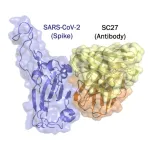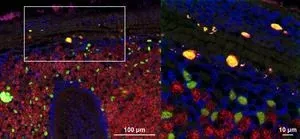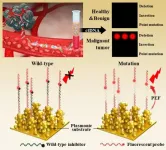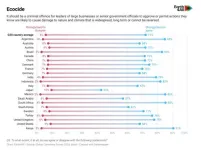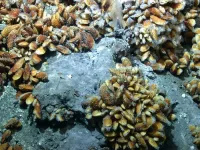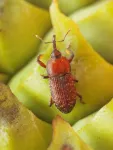(Press-News.org) SAN ANTONIO -- A monoclonal antibody appears effective at neutralizing the numerous variants of SARS-CoV-2, as well as related viruses in animals that could pose a threat if they were to begin spreading in people. The antibody, called SC27, was recently described in Cell Reports Medicine.
The finding opens the possibility of broader, more effective treatments to work against current and future COVID variants.
Monoclonal antibody SC27 was identified, developed and provisionally patented by a team of researchers led by Greg Ippolito, Ph.D., who recently joined Texas Biomedical Research Institute (Texas Biomed) from University of Texas at Austin. Other team leaders included Jason Lavinder, Ph.D., at UT and Ralph Baric, Ph.D., at University of North Carolina at Chapel Hill.
“Other COVID-19 antibodies have been rendered ineffective as SARS-CoV-2 has evolved over the past several years,” says Dr. Ippolito, an Associate Professor. “Our new study suggests the virus is less likely to escape this treatment because SC27 targets and attaches to multiple parts of the virus’s spike protein, including sections that are not mutating as frequently.”
SC27 appears to work in two ways: it blocks the ACE2 binding site, which the virus uses to bind to, enter and infect cells. It also binds to a hidden or “cryptic” site on the underside of the spike protein that is largely unchanged or “conserved” between variants, which means SC27 can broadly recognize variants and related viruses. This is critical because if an antibody’s shape does not match enough with a virus – like two puzzle pieces that don’t quite fit – the antibody can’t effectively neutralize the virus and the virus sneaks by the body’s immune defense system.
The researchers tested SC27 against 12 viruses, from the original SARS-CoV-2 to currently circulating variants, as well as related SARS-1 and several other coronaviruses found in bats and pangolins. The antibody was effective against all of them in a petri dish and protected mice against both variants tested.
“This makes it broader and more effective than any other monoclonal antibody reported in scientific literature to date and the former FDA-approved cocktails,” says Dr. Ippolito, adding the caveat that SC27 still needs to be tested in human clinical trials.
The team is looking to collaborate with industry to further develop the SC27 monoclonal antibody treatment, which could potentially benefit immunocompromised patients who are unable to get vaccines. It also could serve as an emergency treatment during future outbreaks of new variants or coronaviruses. Next steps would include preclinical studies in larger animal models, including nonhuman primates, which are the gold standard to evaluate how complete immune systems respond to a treatment before safely moving to human clinical trials.
Notably, SC27 was found in individuals following vaccination with mRNA COVID-19 vaccines. Previously, this type of “class 1/4” antibody – which attaches to two distinct areas or “epitopes” of the spike protein – was only detected following natural infection from SARS-1.
“This is fantastic news that vaccines can prompt the generation of these more robust and effective antibodies,” explains Dr. Ippolito. “It means that future vaccine development can be tailored to generate these antibodies and have a clear metric for measuring which vaccines will be most effective.”
###
About Texas Biomed
Texas Biomed is a nonprofit research institute dedicated to protecting the global community from infectious diseases. Through basic research, preclinical testing and applied innovation, we accelerate diagnostics, therapies and vaccines for the world’s deadliest pathogens. Our San Antonio campus hosts high containment laboratories and the Southwest National Primate Research Center. Our scientists collaborate with industry and researchers globally, and have helped deliver the first COVID-19 vaccine, the first Ebola treatment and first Hepatitis C therapy. For more information, visit txbiomed.org.
END
One antibody to neutralize them all?
Antibody developed in part by Associate Professor Greg Ippolito, Ph.D., works against a wide range of COVID-19 variants and related coronaviruses, including past, present and potentially future strains
2024-09-06
ELSE PRESS RELEASES FROM THIS DATE:
How context-specific factors control gene activity
2024-09-06
Every cell in our body contains the same DNA, yet liver cells are different from brain cells, and skin cells differ from muscle cells. What determines these differences? It all comes down to gene regulation; essentially how and when genes are turned on and off to meet the cell’s demands. But gene regulation is quite complex, especially because it is itself regulated by other parts of DNA.
Gene regulators: Enhancers, transcription factors
There are two important components that control gene regulation: the first are enhancers, which are short bits of DNA that increase the likelihood that a ...
Detects cancer genes with ultra-high sensitivity!
2024-09-06
Dr. Min-young Lee and Dr. Sung-gyu Park of the Advanced Bio and Healthcare Materials Research Division at KIMS have developed a technology that can detect cancer mutant genes in blood with the world's highest sensitivity of 0.000000001% based on plasmonic nanomaterials for optical signal amplification. The team tested blood samples from lung cancer patients (stages 1-4) and healthy individuals for EGFR mutations and achieved a diagnostic accuracy of 96%.
Previously utilized genetic analysis technologies had low analytical sensitivity to detect mutated genes compared to normal genes, making it difficult to accurately diagnose early-stage cancer patients. ...
Study suggests US droughts, rainy extremes becoming more severe
2024-09-06
COLUMBUS, Ohio – Severe drought in the American Southwest and Mexico and more severe wet years in the Northeast are the modern norm in North America, according to new research – and the analysis suggests these seasonal patterns will be more extreme in the future.
The middle of the United States, meanwhile, can expect bigger swings between wetter wet periods – high-rainfall years known as pluvials – and drier summers through the rest of this century, the study predicts.
Researchers at The Ohio State University say the findings, based on modern precipitation data, historical tree rings and climate models ...
Quality assurance in histopathology laboratories
2024-09-06
The medical field is inherently susceptible to errors, with laboratory tests being no exception. In histopathology laboratories, where tests are considered the gold standard for diagnosing various diseases, errors can significantly impact patient outcomes. Quality Control (QC) and Quality Assurance (QA) programs are essential in minimizing these errors and ensuring the generation of accurate and reliable reports. The complex, multistep nature of histopathology work, combined with the subjective nature of many diagnostic interpretations, ...
Causing environmental damage should be a criminal offense, say 72% of people surveyed in G20 countries
2024-09-06
Nearly three out of four people (72%) surveyed across 18 G20 countries1 support making it a criminal offence for government or leaders of large businesses to approve or permit actions which cause serious damage to nature and climate, finds major new research. This finding is part of the latest Global Commons Survey 2024, conducted by Ipsos UK and commissioned by Earth4All and the Global Commons Alliance (GCA).
The research follows recent landmark legislative changes, including in Belgium where ecocide was recognised as a federal crime earlier this year. Related laws ...
Natural probiotic discovered in UK newborns microbiomes
2024-09-06
Newborn babies have one of three pioneer bacteria in their gut shortly after birth, one of which could be used to develop new personalised infant therapeutic probiotics, researchers show.
In the largest study of UK baby microbiomes to date, researchers from the Wellcome Sanger Institute, University College London (UCL), and the University of Birmingham, used whole genome sequencing to analyse stool samples from 1,288 healthy infants, all under one month old from the UK Baby Biome Study1.
This research, published today (6 September) ...
Hijacking the command center of the cell: nuclear parasites in deep-sea mussels
2024-09-06
Most animals live in intimate relationships with bacteria. Some of these bacteria live inside the cells of their hosts, but only very few are able to live inside cell organelles (structures inside the cell, like organs in the body). One group of bacteria have figured out how to colonize the nuclei of their hosts, a remarkable feat given that the nucleus is the control center of the cell.
To date, nothing is known about the molecular and cellular processes that these intranuclear bacteria use to infect and reproduce in animal hosts. A group of scientists from the Max Planck Institute for Marine Microbiology in Bremen, Germany, now presents the first in-depth analysis ...
The heat generated by the tissues of some plants has played a crucial role in the evolutionary history of insect pollination
2024-09-06
Thermogenesis is a process by which organisms generate internal heat. Although it is usually associated with animals, some plants have also developed this ability. This metabolic process allows certain parts of the plant, such as flowers and inflorescences, to raise their temperature above that of the surrounding environment. Today, these plants, which include cycads and some angiosperms (flowering plants), rely on insects for pollination. The heat they generate helps volatilize and disperse floral fragrances and other chemical compounds that attract insects such as beetles, flies, and ...
Global experts help nanomedicines DELIVER on healthcare promise
2024-09-06
They’re tiny drug-delivery systems 1000 times smaller than a human hair, but while nanomedicines have long been hailed as the future for treating debilitating and life-threatening diseases, their journey from lab to patient has many challenges.
Now, new findings from a global team of expert scientists in academia and industry has generated world-first research quality standards that will help slash costs and reduce the time it takes to develop advanced nanomedicine treatments and make them available for patients.
Published in Nature Nanotechnology today, and led by the University of South Australia’s Dr Paul Joyce and the University ...
Galaxies are much much bigger than we thought
2024-09-06
If this galaxy is typical, then the study, published today in Nature Astronomy, indicates that our galaxy is already interacting with its closest neighbour, Andromeda.
Where does a galaxy end and deep space begin? It seems like a simple question until you look more closely at the gas that surrounds galaxies, known as the circumgalactic medium.
The halo of gas surrounding the stellar disc accounts for about 70% of the mass of the galaxy – excluding dark matter – but until now has remained something of a mystery. In the past we have only been able to observe the gas by measuring the light from a background object, ...
LAST 30 PRESS RELEASES:
Natural selection operates on multiple levels, comprehensive review of scientific studies shows
Developing a national research program on liquid metals for fusion
AI-powered ECG could help guide lifelong heart monitoring for patients with repaired tetralogy of fallot
Global shark bites return to average in 2025, with a smaller proportion in the United States
Millions are unaware of heart risks that don’t start in the heart
What freezing plants in blocks of ice can tell us about the future of Svalbard’s plant communities
A new vascularized tissueoid-on-a-chip model for liver regeneration and transplant rejection
Augmented reality menus may help restaurants attract more customers, improve brand perceptions
Power grids to epidemics: study shows small patterns trigger systemic failures
Computational insights into the interactions of andrographolide derivative SRJ09 with histone deacetylase for the management of beta thalassemia
A genetic brake that forms our muscles
CHEST announces first class of certified critical care advanced practice providers awarded CCAPP Designation
Jeonbuk National University researchers develop an innovative prussian-blue based electrode for effective and efficient cesium removal
Self-organization of cell-sized chiral rotating actin rings driven by a chiral myosin
Report: US history polarizes generations, but has potential to unite
Tiny bubbles, big breakthrough: Cracking cancer’s “fortress”
A biological material that becomes stronger when wet could replace plastics
Glacial feast: Seals caught closer to glaciers had fuller stomachs
Get the picture? High-tech, low-cost lens focuses on global consumer markets
Antimicrobial resistance in foodborne bacteria remains a public health concern in Europe
Safer batteries for storing energy at massive scale
How can you rescue a “kidnapped” robot? A new AI system helps the robot regain its sense of location in dynamic, ever-changing environments
Brainwaves of mothers and children synchronize when playing together – even in an acquired language
A holiday to better recovery
Cal Poly’s fifth Climate Solutions Now conference to take place Feb. 23-27
Mask-wearing during COVID-19 linked to reduced air pollution–triggered heart attack risk in Japan
Achieving cross-coupling reactions of fatty amide reduction radicals via iridium-photorelay catalysis and other strategies
Shorter may be sweeter: Study finds 15-second health ads can curb junk food cravings
Family relationships identified in Stone Age graves on Gotland
Effectiveness of exercise to ease osteoarthritis symptoms likely minimal and transient
[Press-News.org] One antibody to neutralize them all?Antibody developed in part by Associate Professor Greg Ippolito, Ph.D., works against a wide range of COVID-19 variants and related coronaviruses, including past, present and potentially future strains
